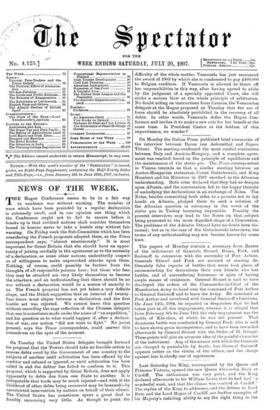NEWS OF 'ERE WEEK.
THE Hague Conference seems to be in a fair way to condemn war without warning. The number of wars which have been preceded by a regular declaration is extremely small, and in our opinion one thing which the Conference ought not to fail to ensure before it breaks up is that civilised nations shall consider themselves bound in honour never to take a hostile step without fair warning. On Friday week the Sub-Committee which has been considering the French proposals adopted them, as the Times correspondent says, "almost unanimously." It is most important for Great Britain that she should have an oppor- tunity of joining cordially in the agreement as to the necessity of a declaration, as some other nations undoubtedly suspect us of willingness to make unprovoked attacks upon them. Nothing, of course, could possibly be further from the thoughts of all responsible persons here; but those who fear they may be attacked are very likely themselves to become the attackers, and an understanding that there should be no war without a declaration would be a source of security to us. The French proposal has not yet taken a very definite shape, and the Dutch suggestion that an interval of twenty. four hours must elapse between a declaration and the first hostile act was rejected. We cannot leave this question without recording the sage reflection of the Chinese delegate that war is sometimes made under the name of "an expedition," and his question as to what would happen if, after a declara- tion of war, one nation "did not want to fight." No jurist present, says the Times correspondent, could answer this conundrum on the spur of the moment.






































